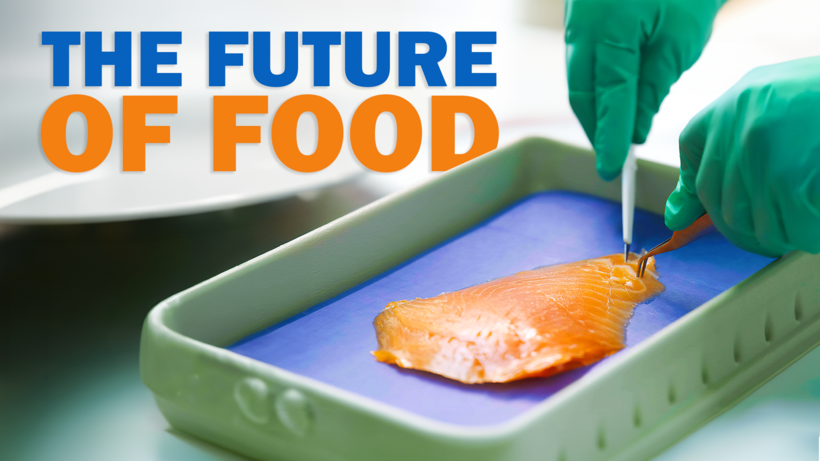The Future of Food
Explore groundbreaking innovations in food production that promise to transform agriculture for a sustainable future.
From the rise of plant proteins and lab-grown meat to modern farming techniques preserving Alpine biodiversity, this series delves into the challenges and solutions of feeding a growing global population. Investigate the competition between food and animal feed, the potential of vertical farming, and the pioneering efforts of farmers, scientists, and startups. Join us on a journey to discover how we can create a more sustainable, efficient, and ethical food system for generations to come.
Episodes
-
Rethinking Food – Towards a Meat-Free Future
Meat production is under pressure. Instead of meat, we will increasingly eat plant proteins. How will this nutritional turnaround play out and what does it mean for agriculture? Meat and milk production are under increasing pressure. Reasons for this are climate protection, biodiversity, and ethics. "We can no longer afford our meat consumption of today," says trend researcher Christine Schäfer from the Gottlieb Duttweiler Institute. Schäfer predicts a protein turnaround. We will increasingly eat vegetable proteins and cultured meat from the laboratory. The researcher even believes it is possible that Switzerland will be completely meat-free by 2050. What could the nutritional transition look like? What does it mean for agriculture, and what is the state of research on lab-grown meat? This film provides answers to these questions.
-
Vertical Farming – Can High-Tech Vegetable Factories Save Our World?
Soils are depleted, groundwater sources are drying up, nitrates and pesticides are polluting the environment. The intensive cultivation methods of today's agriculture are reaching their limits. The world's population will grow by 25 percent by 2050 and all these people will need more healthy food. Vertical farming is supposed to be the solution. But is the market ready for high-tech vegetable factories? A vertical farm offers many advantages: The indoor system requires 95 percent less water, cultivation is pesticide-free and indoor farmers can grow 300 times more vegetables per square meter of factory space - vertically. However, the high-tech factories are struggling to establish themselves on the market.
-
Food vs. Feed – When Humans and Animals Compete for Food
Should farm animals play any role at all in a sustainable food system? Only if they are fed in a way that does not jeopardize global food security, researchers say. One third of the world's farmland is used to produce food for livestock. More and more people are saying that this is inefficient and unsustainable for a growing world population. Animals could eat what humans can't. Waste from the food industry, for example. But it's not that simple. Some options are banned by law, such as kitchen or food waste. And so scientists and startups across Europe are researching the feed of the future. Is it the black soldier fly or duckweed that thrives best on manure? Or do we need to think about the food cycle in a completely different way?
-
Norway's Algae – Sustainable Superfood
In 2050, the earth will have to feed two billion more people than it does today. How can this be done without overstraining the planet? Algae, the most nutritious and healthy plants, are a promising resource for our future nutrition. Norwegians have rediscovered this potential and are harvesting wild algae or cultivating them in aquaculture for the food market. They do pioneering work every day, because research into algae cultivation is still in its infancy. Algae are not only good for people, they also help to protect the climate. We follow Norwegian pioneers and companies who strive to use algae for the environment and as the food of tomorrow.
-
Modern Farming – Conserving Alpine Fauna
The Alpine region is home to 30,000 animals and 13,000 plants. But the diverse ecosystem is endangered. What innovative approaches can preserve this unique ecosystem? Climate change, urbanisation, mass tourism as well as industrial forms of agriculture and globalisation are threatening biodiversity in the Alps and thus the livelihood of alpine farmers. But how can sustainable agriculture be shaped that can preserve this unique biodiversity? We meet the new generation of farmers, chefs, and gourmets who all have a common goal: the preservation of Alpine diversity.
Facts
-
Year2021 - 2023
-
Length5 × 30' (ENG, GER)
-
ResolutionHD
-
Produced by
